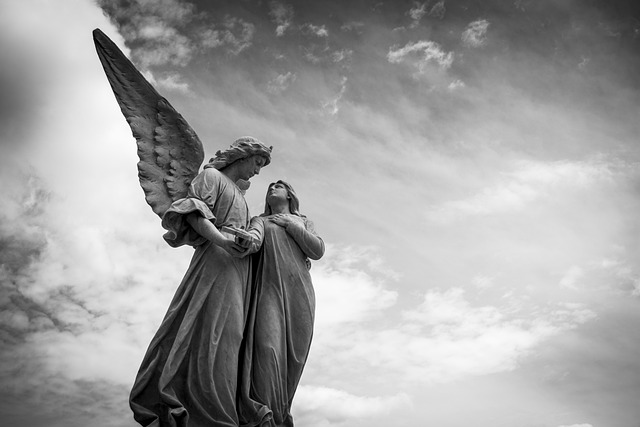Angels are spiritual beings mentioned throughout the Bible, serving as messengers of God and protectors of humanity. In Christian tradition, angels are often depicted as beings of light and purity, carrying out God’s will and providing guidance and protection to believers. The symbolism of angels in the Bible represents divine intervention, protection, and the presence of God in the lives of believers.
Table of Contents
Angels in the Bible: Messengers of God
Angels have always been a fascinating topic for many people, whether they are believers or not. In the Bible, angels are often portrayed as messengers of God, sent to deliver important messages or to protect and guide individuals. The word “angel” itself comes from the Greek word “angelos,” which means messenger. Throughout the Bible, angels play a significant role in the lives of many individuals, from the Old Testament to the New Testament.
In the Old Testament, angels are often seen as messengers of God, delivering important messages to individuals such as Abraham, Moses, and Daniel. In the book of Genesis, angels are sent to protect Lot and his family from the destruction of Sodom and Gomorrah. In the book of Exodus, an angel of the Lord appears to Moses in the burning bush, instructing him to lead the Israelites out of Egypt. Angels are also seen as warriors, fighting on behalf of God’s people against their enemies.
In the New Testament, angels continue to play a significant role in the lives of individuals. In the Gospel of Luke, an angel appears to Mary to announce the birth of Jesus. Angels also appear to shepherds in the fields to announce the birth of the Savior. Throughout the Gospels, angels are seen ministering to Jesus during his time of temptation in the wilderness and comforting him in the Garden of Gethsemane before his crucifixion.
Angels are often depicted as beings of light, with wings and a halo, but in reality, angels are spiritual beings created by God to serve and worship Him. They are not to be worshipped themselves, but rather to point individuals towards God and His will for their lives. Angels are messengers of God, delivering His messages and carrying out His will on earth.
The Bible also speaks of different types of angels, such as archangels, cherubim, and seraphim. Archangels are high-ranking angels who are often seen as leaders among the angelic host. Cherubim are often depicted as guarding the throne of God, while seraphim are seen as beings of fire who worship and praise God continually.
Angels are also seen as protectors and guardians of individuals. In the book of Psalms, it says that God will command His angels to guard us in all our ways. In the book of Hebrews, it says that angels are ministering spirits sent to serve those who will inherit salvation. Angels are always present, watching over us and protecting us from harm.
In conclusion, angels play a significant role in the Bible as messengers of God, delivering important messages and protecting and guiding individuals. They are spiritual beings created by God to serve and worship Him, not to be worshipped themselves. Angels are seen as beings of light, with wings and a halo, but in reality, they are powerful beings who carry out God’s will on earth. As believers, we can take comfort in knowing that angels are always present, watching over us and protecting us from harm.
The Role of Angels in Biblical Stories
Angels have always played a significant role in biblical stories, serving as messengers of God and protectors of humanity. In the Bible, angels are often depicted as beings of light, sent by God to guide and protect his people. They are seen as powerful and majestic beings, with the ability to perform miracles and deliver messages from the divine.
One of the most well-known stories involving angels is the story of the Annunciation, where the angel Gabriel appears to the Virgin Mary to announce that she will give birth to the Son of God. This story highlights the important role that angels play in delivering messages from God and carrying out his divine plan.
Angels are also seen as protectors of humanity, watching over us and guiding us in times of need. In the book of Psalms, it is written that “He will command his angels concerning you to guard you in all your ways.” This passage emphasizes the belief that angels are always present, ready to protect and guide us through life’s challenges.
Throughout the Bible, angels are often depicted as warriors, fighting against evil forces and protecting God’s people. In the book of Revelation, angels are described as powerful beings who wage war against the forces of darkness and ultimately triumph over evil. This imagery reinforces the idea that angels are powerful and mighty beings who are always working to protect and defend God’s people.
Angels are also seen as messengers of God, delivering important messages and revelations to his people. In the book of Daniel, the angel Gabriel appears to Daniel to interpret his visions and reveal God’s plan for the future. This story highlights the important role that angels play in delivering messages from God and providing guidance to his people.
In addition to their role as messengers and protectors, angels are also seen as beings of light and purity. In the book of Isaiah, it is written that “each of the seraphim had six wings: with two he covered his face, and with two he covered his feet, and with two he flew.” This passage emphasizes the holiness and purity of angels, who are seen as beings of light and goodness.
Overall, angels play a crucial role in biblical stories, serving as messengers, protectors, and warriors for God. They are powerful and majestic beings who are always present, ready to guide and protect us in times of need. The symbolism of angels in the Bible reinforces the belief that we are never alone, and that God’s angels are always watching over us, guiding us, and protecting us from harm.
Angelic Protection: Stories from the Bible

Angels have always been a fascinating topic in religious and spiritual discussions. In the Bible, angels are often portrayed as messengers of God, sent to protect and guide His people. The word “angel” itself comes from the Greek word “angelos,” which means messenger. Throughout the Bible, there are numerous stories of angels appearing to people in times of need, offering comfort, protection, and guidance.
One of the most well-known stories of angelic protection in the Bible is the story of Daniel in the lion’s den. In this story, Daniel is thrown into a den of hungry lions as punishment for praying to God instead of the king. However, God sends an angel to shut the mouths of the lions, protecting Daniel from harm. This story serves as a powerful reminder of God’s protection and the power of angels to intervene on behalf of His people.
Another famous story of angelic protection is the story of Shadrach, Meshach, and Abednego in the fiery furnace. These three men refuse to bow down to a golden statue and are thrown into a furnace as punishment. However, God sends an angel to protect them, and they emerge from the furnace unharmed. This story illustrates the faithfulness of God to His people and the miraculous ways in which He can deliver them from harm.
In the New Testament, angels continue to play a significant role in protecting and guiding God’s people. In the Gospel of Matthew, an angel appears to Joseph in a dream, instructing him to take Mary and Jesus to Egypt to escape King Herod’s wrath. This act of divine intervention demonstrates the importance of angels in carrying out God’s will and protecting His chosen ones.
Throughout the Bible, angels are also depicted as warriors, fighting on behalf of God’s people against spiritual forces of evil. In the book of Revelation, angels are described as waging war against the dragon and his followers, ultimately defeating them and ushering in God’s kingdom. This imagery of angels as powerful warriors highlights their role in spiritual warfare and their ability to protect believers from harm.
In addition to their role as protectors and warriors, angels are also seen as messengers of God’s love and grace. In the Gospel of Luke, an angel appears to the shepherds to announce the birth of Jesus, proclaiming “Do not be afraid. I bring you good news that will cause great joy for all the people.” This message of hope and salvation is a central theme in the Bible, and angels are often the bearers of this good news to humanity.
Overall, the biblical symbolism of angels is rich and multifaceted. They are messengers, protectors, warriors, and bearers of God’s love and grace. The stories of angelic protection in the Bible serve as a reminder of God’s faithfulness and His willingness to intervene on behalf of His people. As believers, we can take comfort in the knowledge that angels are watching over us, ready to protect and guide us in times of need.
Angels as Symbols of Guidance and Comfort
Angels have long been a symbol of guidance and comfort in the Bible. They are often depicted as messengers from God, sent to deliver important messages or provide protection to those in need. In the Bible, angels are described as powerful beings who serve as intermediaries between God and humanity. They are often portrayed as beings of light, with wings and a halo, symbolizing their divine nature.
One of the most well-known stories involving angels in the Bible is the story of the angel Gabriel appearing to Mary to announce the birth of Jesus. This story is a powerful example of how angels can bring messages of hope and joy to those in need. Angels are often seen as messengers of God, delivering important news or guidance to those who are open to receiving it.
In addition to being messengers, angels are also seen as protectors and comforters. In times of trouble or distress, angels are believed to be present, offering comfort and guidance to those in need. The Bible is full of stories of angels appearing to people in times of need, providing them with strength and reassurance.
One of the most famous stories involving angels as protectors is the story of Daniel in the lion’s den. In this story, Daniel is thrown into a den of lions as punishment for his faith, but an angel appears to him and protects him from harm. This story is a powerful reminder of the protective power of angels and their ability to provide comfort in times of trouble.
Angels are also seen as symbols of guidance in the Bible. They are often depicted as leading people on the right path, helping them to make important decisions and navigate difficult situations. In the book of Exodus, for example, an angel leads the Israelites out of Egypt and through the wilderness to the promised land. This story is a powerful example of how angels can provide guidance and direction to those who are lost or in need of help.
In addition to providing guidance and comfort, angels are also seen as symbols of God’s love and protection. They are often described as being filled with love and compassion, and are believed to be constantly watching over and caring for humanity. In times of trouble or distress, angels are believed to be present, offering comfort and support to those in need.
Overall, angels are powerful symbols of guidance and comfort in the Bible. They are seen as messengers of God, delivering important messages and providing protection to those in need. They are also seen as symbols of love and compassion, offering comfort and support to those who are struggling. Whether they appear in physical form or simply as a presence in times of need, angels are a powerful reminder of God’s love and care for humanity.
The Hierarchy of Angels in Christian Tradition
Angels have always held a special place in Christian tradition, with their presence and significance being mentioned throughout the Bible. In Christian theology, angels are believed to be spiritual beings created by God to serve as messengers and protectors of humanity. The hierarchy of angels in Christian tradition is a fascinating topic that sheds light on the different roles and responsibilities of these celestial beings.
According to Christian tradition, angels are organized into a hierarchy that consists of nine different orders or choirs. Each choir has its own unique characteristics and functions, with the highest choir being the Seraphim and the lowest being the Angels. The Seraphim are believed to be the closest to God and are described as having six wings and constantly praising and worshiping God. The Cherubim are the second highest choir and are often depicted as having four faces and four wings, symbolizing their wisdom and knowledge.
The Thrones are the third highest choir and are said to be the ones who carry out God’s justice and judgment. The Dominions, Virtues, and Powers are the next three choirs, each with their own specific roles in maintaining order and harmony in the universe. The final three choirs are the Principalities, Archangels, and Angels, with the Archangels being the most well-known and often mentioned in the Bible.
The hierarchy of angels in Christian tradition serves to illustrate the diversity and complexity of the spiritual realm, with each choir playing a vital role in carrying out God’s will. While the concept of angelic hierarchy may seem abstract and esoteric, it serves as a reminder of the intricate and interconnected nature of the spiritual world.
In the Bible, angels are often depicted as messengers of God, delivering important messages and guidance to humanity. They are also seen as protectors and guardians, watching over individuals and intervening in times of need. The presence of angels in the Bible serves to emphasize the divine connection between heaven and earth, with angels acting as intermediaries between God and humanity.
One of the most well-known angels in the Bible is Archangel Michael, who is often depicted as a warrior angel fighting against evil forces. Michael is seen as a powerful and protective figure, symbolizing courage, strength, and righteousness. Another prominent angel in the Bible is Gabriel, who is known for delivering important messages to individuals such as the Virgin Mary and Zechariah.
The symbolism of angels in the Bible is rich and multifaceted, with each angel representing different qualities and attributes. Angels are often associated with purity, holiness, and divine intervention, serving as a source of comfort and guidance for believers. The presence of angels in the Bible serves to remind us of the spiritual realm and the unseen forces at work in the world.
In conclusion, the hierarchy of angels in Christian tradition is a fascinating and complex topic that sheds light on the diverse roles and responsibilities of these celestial beings. Angels play a crucial role in the spiritual realm, serving as messengers, protectors, and guardians of humanity. The symbolism of angels in the Bible serves to emphasize the divine connection between heaven and earth, with angels acting as intermediaries between God and humanity. The presence of angels in the Bible serves as a reminder of the spiritual forces at work in the world and the importance of faith and divine guidance.
Conclusion
In conclusion, angels in the Bible are often seen as messengers of God, serving as a link between heaven and earth. They are depicted as beings of light and purity, carrying out God’s will and providing guidance and protection to believers. The presence of angels in the Bible symbolizes divine intervention, protection, and the presence of God in the lives of believers.
For licensing reasons, we must provide the following notice: This content was created in part with the help of an AI.


